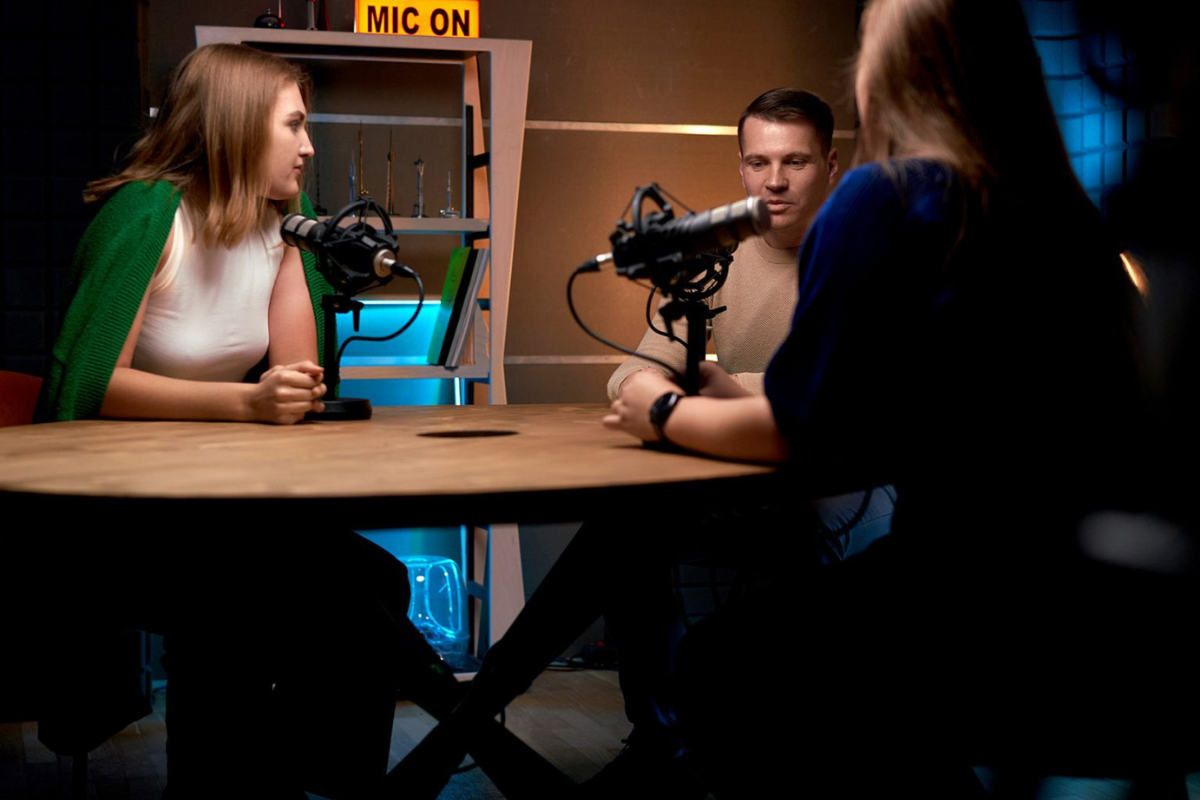In recent years, the business world has seen a remarkable surge in the popularity of podcasts. Why? Because podcasts led by CEOs are giving a fresh, real-world take on business and leadership. They’re sharing stories and insights you just can’t get from short articles or quick social media updates.
Think about it – your own stories and experiences in leading a business hold immense value. Podcasts are perfect for sharing these in detail. They let you talk about real challenges and successes in a nuanced way that really connects with listeners.
So, let’s jump into how starting your own podcast can not only boost your personal brand but also position you as the go-to expert in your field.

Defining purpose and audience
As a CEO, you need to set clear objectives for your podcast. Ask yourself, what do you want to achieve? It could be building brand awareness, expanding your network, fostering a community or enhancing your personal brand.
Each objective requires a different approach, but the key is to be clear and focused. For instance, if it’s brand awareness, your content should showcase your company’s values and vision. If it’s networking, consider inviting industry leaders and experts as guests.
Team up with other podcasters, CEOs and well-known personas in your industry.
It’s essential to know who you’re speaking to. Are they aspiring entrepreneurs, seasoned business leaders or perhaps individuals outside the business world who can benefit from your insights? Understanding your audience helps tailor your content to their interests and needs. Dive deep into their challenges, aspirations and questions they may have about your industry or leadership.
Content themes and format
Themes need to align with your expertise and your audience’s interests. For example, if you’re a tech CEO, a theme could be ‘Innovations Shaping the Future’, where you discuss emerging technologies and their impact on society and business. Another theme might be ‘Leadership in Times of Change’, perfect for a CEO with experience in guiding companies through significant transitions.
Now, let’s consider the format of your podcast:
Interviews: This format involves inviting guests for one-on-one conversations. Pros include access to diverse perspectives and networking opportunities. However, it requires coordination and preparation time to ensure a smooth and informative conversation.
Solo episodes: Here, you share your insights or experiences directly with your audience. The advantage is complete control over the content and a more personal connection with your audience. However, consistently generating engaging content solo can be challenging.
Co-hosted shows: Pairing up with a co-host can add dynamic interaction and diversify viewpoints. It can reduce the pressure of content creation but requires finding a co-host with complementary skills and a compatible schedule.
Panel discussions: Involving multiple guests can lead to a rich exchange of ideas. It’s great for covering diverse opinions on a topic but can be challenging to organize and might require more editing and coordination.
While interviews and panel discussions can diversify content and share the workload, solo and co-hosted formats offer more control and consistency. The key is to find a balance that works for you.

Building your team
As a busy CEO, you’ll need a team that will help you bring the podcast to life – and keep it going. Select individuals who align with your podcast’s vision and can efficiently handle their respective roles:
Host (you): As the CEO, your primary role is as the host. Focus on delivering engaging content and leveraging your expertise. Plan your involvement in terms of time commitment and content direction.
Producer: The producer will handle episode planning, guest coordination and ensuring each episode aligns with your podcast’s themes and objectives. If you don’t have someone in-house, consider hiring an external producer or agency with a proven track record in podcasting.
Editor: Identify a skilled audio editor, either from your existing team or through outsourcing. The editor should have experience in audio mixing and editing to ensure your podcast sounds professional. Provide clear guidelines on the desired audio quality and style.
If your organization has skilled individuals in content creation, audio engineering or marketing, leveraging these internal resources can be cost-effective and align with your company culture. However, the specific demands of podcast production – like high-quality audio editing, engaging scriptwriting or podcast promotion – might require external expertise.
Marketing and promotion
Get people excited about your podcast before it even hits the airwaves. How? Use social media to your advantage. Post engaging snippets, thought-provoking quotes and behind-the-scenes glimpses on platforms like LinkedIn, X and Instagram.
Reach out to your contacts with a simple, personalized message. Tell them about your podcast and why it might be right up their alley. This personal touch can make a big difference, helping you gather a dedicated listener base from day one.
Reach out to your contacts with a simple, personalized message.
Team up with other podcasters, CEOs and well-known personas in your industry. Appear on each other’s shows. This is a good way to reach more people and add variety to your show.
If your budget allows, invest in targeted ads. Place them where your potential audience is most active, like certain social media platforms or podcast websites. The key is precision – make sure your ads find the people who will really love what you’re offering.
Finally, turn listeners into a community and stay active on social media. Chat with your audience, respond to their feedback and maybe even host live Q&A sessions. Effective podcast marketing is about cultivating a community that eagerly awaits each episode.

Tell your story
Podcasts like Masters of Scale and The Marie Forleo Podcast are great examples of why podcasting is a great tool for CEOs.
Reid Hoffman co-founded LinkedIn and uses his Masters of Scale podcast to share business tips and stories from other big names in the business. His podcast is a great way for him to share his knowledge and build a strong reputation as a leader in business thinking.
Then there’s The Marie Forleo Podcast. She mixes business advice with personal growth tips. Her friendly and relatable way of talking has built a loyal group of listeners. Her podcast shows how CEOs can use podcasts to not just talk about business, but also to inspire and encourage their listeners.
As a CEO, your voice and experiences can inspire, educate and influence, making podcasting a highly effective tool for communication and brand building.







